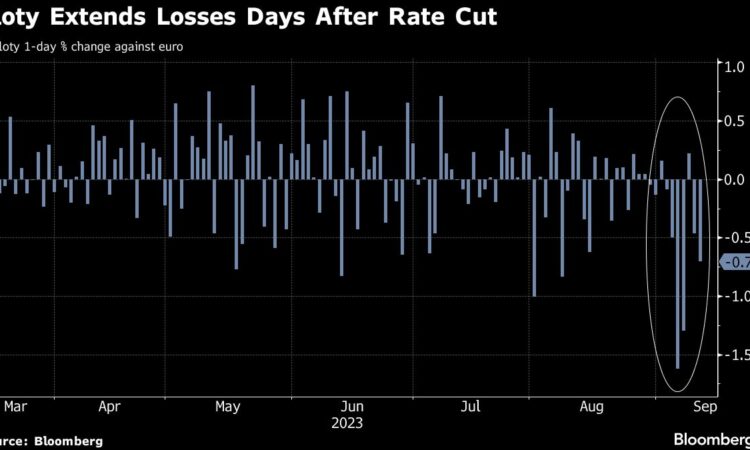
(Bloomberg) — The steep rout in eastern European currencies is raising speculation among market strategists that policymakers will have to slow their plans to ease monetary policy.
Most Read from Bloomberg
The Polish currency dropped 0.3% against the euro, extending its decline to 3.4% in the past week after a bigger-than-expected rate cut roiled markets. With Hungary already months into an easing cycle and the Czech Republic weighing when it should embark on its own, the three countries led losses across emerging markets.
Last week’s 75 basis-point rate cut in Poland, which was three times larger than expected, sparked the selloff as it raised questions about the central bank’s determination to curb inflation weeks before parliamentary elections. The move was “premature” because of persistent inflation, central banker Przemyslaw Litwiniuk told TVN24 television in an interview Monday.
Bank of America strategists on Tuesday closed a long euro-zloty position as they expect authorities will step in to bolster the currency, “via verbal, direct interventions or liquidity management,” strategists led by Mikhail Liluashvili wrote in a note.
The extent of the decline appears to have put also some policymakers on notice. What happened to the zloty is a clear signal about how such rate decisions can impact the central bank’s credibility, another member of the Polish Monetary Policy Council Ludwik Kotecki told reporters on Tuesday.
In the Czech Republic, board member Jan Prochazka said in an interview for E15 newspaper that his central bank must avoid cutting interest rates too soon as underlying inflationary pressures are still “very strong.”
“We will spend a long time weighing the pros and cons before we cut rates,” Prochazka said.
Czech Inflation Eases to 20-Month Low Before Rate-Cut Debate
Czech money-market prices now imply about 75 basis points of rate cuts this year, starting in November at the latest.
However, with the koruna trading at its weakest level in a year and developed-market central banks keeping rates higher for longer than expected, voices of caution have multiplied.
The currency-market declines “should convince Czech and Hungarian central banks to be more cautious with monetary loosening in the short term,” BNP Paribas economist Wojciech Stepien said in an email.
Contagion Risk
It’s a mistake to view the region as homogeneous, according to Dominik Rusinko, an economist at CSOB AS in Prague.
“Some investors therefore may get the impression that the Czech National Bank could proceed in a similar aggressive way as the National Bank of Poland,” Rusinko said Friday. “In our view, it is not on the table at all.”
Hungary’s inflation rate, which has long been the highest in the European Union, dropped to the lowest level in a year, data showed last week. The central bank in Budapest on Tuesday signaled a 100 basis point rate reduction for September via a step to simplify its interest rate regime. It had previously warned it won’t repeat cuts “on autopilot” and will have to evaluate data at each turn.
Goldman and JPMorgan Diverge on Zloty Outlook After Rates Drama
“The read-across from NBP’s decision to other EM central banks should be limited as these have generally taken a more gradual approach to easing rates,” Goldman Sachs Group Inc. said in a note Friday. “The recent bout of FX weakness could add some pressure on the Hungarian central bank to slow the pace of cuts.”
–With assistance from Krystof Chamonikolas, Konrad Krasuski and Kerim Karakaya.
(Updates with Bank of America comments on zloty recommendation in fourth paragraph, closes prices)
Most Read from Bloomberg Businessweek
©2023 Bloomberg L.P.



